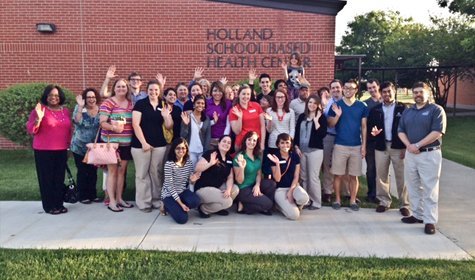In rural communities, it can be a long way to the nearest doctor’s office or pharmacy.
Such is the case in Holland, Texas, a small town of about 1,200 residents that is located 21 miles south of Temple. Poverty is common and access to a major grocery store, let alone health care, is limited. For some families, going to a larger city to get groceries or to see a physician is a real struggle because they may not have time, or the money, to do both.
An appreciation for the challenges facing populations like those in Holland inspired Catherine McNeal, M.D., Ph.D., associate professor of internal medicine and pediatrics at the Texas A&M Health Science Center College of Medicine in Temple, to create a Rural Health Rotation program aimed at teaching medical students and nursing students about the barriers to health faced by rural populations. Ultimately she hopes that through this program, more TAMHSC graduates will choose to practice in rural areas.
Holland was a natural choice for the program because of an existing school-based clinic that was established in 1992 through a partnership between the Holland Independent School District (HISD) and Scott & White (now Baylor Scott & White Health). The clinic received initial funding from the State of Texas and the Robert Wood Johnson Foundation.
Although school-based clinics exist in other communities, the one in Holland is unique because it provides care for people of all ages and from any community. It is staffed by resident physicians from Baylor Scott & White, including those in the pediatric and family medicine programs.
In addition to exposing first-year medical students to the concerns that people in rural communities face, the Rural Health Rotation program gives them practical clinical experience, which is unique for early medical education when most of students’ time is usually spent in the classroom learning anatomy and other health care basics.
Now in its fifth year, the program also pairs medical students with nursing students from the University of Mary Hardin-Baylor (UMHB) so they can learn the importance of working together as a team to deliver the best patient care and also learn to appreciate the unique skills from each profession that can be combined to enhance patient care, especially for rural residents.
The program is based at the HISD campus, and the HISD superintendent and school nurse recommend families that could benefit from it. Approximately 15 medical students and an equal number of nursing students are paired in groups of two or three with each family.
For the past two years, second-year medical students who participated in the program as first-year students have been asked to help lead the program, which provides an additional learning opportunity.
“Student leaders bring fresh ideas and energy to the rotation,” McNeal said.
Texas A&M College of Medicine faculty members from Baylor Scott & White and the Central Texas Veterans Health Care System, as well as faculty members from UMHB, work with each team of medical and nursing students to provide direction and guidance when the students have their monthly meetings with the families.
“This rotation has really established a two-way education,” McNeal said. “The families do a wonderful job teaching the students about the real-life struggles they face and, on the other end, the students provide information about health topics and clarify any misconceptions the families might have.”
Each of the participating families has special health care issues such as asthma or diabetes that their student groups help them manage. All of the families have children as well, many with special needs, exposing the students to the even greater challenges faced by families who need pediatric care.
“What I have noticed is that one of the largest struggles for our patients is finding the support to take that first step toward improving their health,” said Andy Marshall, a second-year medical student who currently serves as one of two student advisors for the program. “This program does a wonderful job of not only allowing us to develop a relationship and support system with the family, but also gives the families an opportunity to network and create a support system within the community.”
Katherine Rendon, a current third-year medical student, participated in the program during her first year of medical school and served as a student advisor during her second year.
“One of the aspects that I think we benefitted from was that we got access to patients so early on in our education,” Rendon said. “Since we had very little education in medicine at that time, we started out with the basics—speaking with the families to become comfortable interacting with our patients. Getting to know the families gave me a more patient-centered focus that I know I will carry into my practice, and it allowed our families to take a more active role in their health care.”
McNeal said she is delighted to see how fully the community of Holland has embraced the idea of accessible health care. “I think the Holland ISD has solved the problem of delivering health care to rural residents through its unique school-based clinic and by supporting the training of young doctors and nurses. If our nation wants to improve health care delivery, it needs to look at a tiny town in Central Texas to find the answers.”


![FDA Forced to Retract Misleading Statements on Ivermectin’s COVID-19 Use After Legal Challenge [VIDEO]](https://i0.wp.com/austincountynewsonline.com/wp-content/uploads/2016/05/fda.jpg?resize=440,264)

:quality(75)/https://static.texastribune.org/media/files/4b25469bb109b715051f54458791074f/0303%20Panhandle%20Canadian%20JR%20TT%2025.jpg?resize=440,264)
:quality(75)/https://static.texastribune.org/media/files/dd1e9b420f50ae0376da4d0712cbb91a/Dairy%20Story%20IPA%2012.jpg?resize=440,264)
